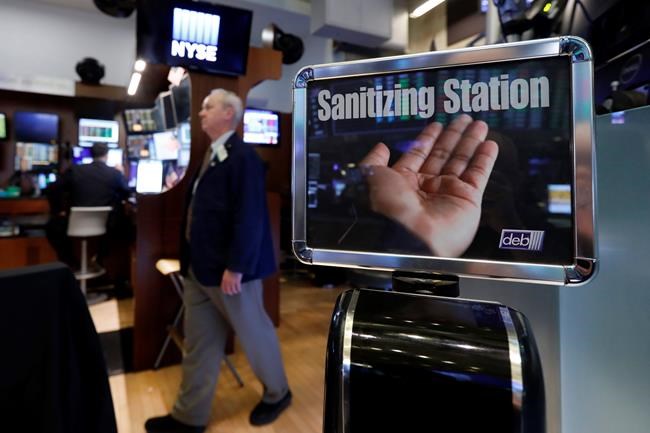Fed survey finds coronavirus impacting parts of US economy
Advertisement
Read this article for free:
or
Already have an account? Log in here »
To continue reading, please subscribe:
Monthly Digital Subscription
$0 for the first 4 weeks*
- Enjoy unlimited reading on winnipegfreepress.com
- Read the E-Edition, our digital replica newspaper
- Access News Break, our award-winning app
- Play interactive puzzles
*No charge for 4 weeks then price increases to the regular rate of $19.00 plus GST every four weeks. Offer available to new and qualified returning subscribers only. Cancel any time.
Monthly Digital Subscription
$4.75/week*
- Enjoy unlimited reading on winnipegfreepress.com
- Read the E-Edition, our digital replica newspaper
- Access News Break, our award-winning app
- Play interactive puzzles
*Billed as $19 plus GST every four weeks. Cancel any time.
To continue reading, please subscribe:
Add Free Press access to your Brandon Sun subscription for only an additional
$1 for the first 4 weeks*
*Your next subscription payment will increase by $1.00 and you will be charged $16.99 plus GST for four weeks. After four weeks, your payment will increase to $23.99 plus GST every four weeks.
Read unlimited articles for free today:
or
Already have an account? Log in here »
Hey there, time traveller!
This article was published 04/03/2020 (2107 days ago), so information in it may no longer be current.
WASHINGTON – The Federal Reserve’s latest nationwide survey of business conditions has found that the coronavirus outbreak has begun to impact tourism and disrupt manufacturing chains in parts of the United States.
The survey compiled by the Fed’s 12 regional banks and released Wednesday found that growth through late February continued at a moderate rate. But it noted that concerns are rising about how the virus that began in China might impact the U.S. economy.
Tourism from China is being affected and American manufacturers are beginning to report supply chain delays, the report said.

The Fed’s San Francisco regional bank reported that the COVID-19 outbreak has led to decreased demand for aircraft from China and other Southeast Asian nations. Some American solar equipment manufacturers have also experienced delayed shipments due to supply-chain disruptions.
The survey, known as the beige book, will be part of the discussion when Fed officials meet later this month to review interest rates.
The Fed on Tuesday announced a surprise half-point cut in its benchmark rate in an effort to support the economy in the face of the spreading virus. The move, which pushed the Fed’s policy rate down to a range of 1% to 1.25%, marked the largest cut since the 2008 financial crisis.
Some analysts believe the Fed will cut rates even further at its March 17-18 meeting, especially if the effects of the coronavirus have grown more serious by that time.
Federal Reserve Chairman Jerome Powell said at a news conference Tuesday that the Fed is “hearing concerns from people, for example in the travel business, the hotel business and things like that.”
Fed officials expect the impact to grow “and that’s one of the reasons we have come to the view that it would be appropriate for us today to move to support the economy and that’s what we have done,” Powell said.
The Fed survey found that half of the central bank’s districts — Philadelphia, Cleveland, Richmond, Chicago, Dallas and San Francisco — were reporting impacts from the coronavirus.
Philadelphia reported fewer tour groups from China and found that local customers had been avoiding some of the city’s Asian restaurants and shops because of unfounded fears about the virus.
Cleveland reported that some manufacturers in that district experienced weaker demand from China due to temporary factory shutdowns in that country.
In California, there were reports that the virus outbreak in China had already started to negatively impact exports of nuts and other farm products from the state.
The beige book report noted that consumer spending had generally picked up in the January-February period, although the growth was uneven and the results from auto sales were mixed.
“Outlooks for the near-term were mostly for modest growth with the coronavirus and the upcoming presidential election cited as potential risks,” the Fed report said.
While employment grew in most sectors, hiring was constrained by a tight labour market that had led to delays for some construction projects.
Many firms were optimistic that President Donald Trump’s Phase One trade deal that lowered some of the tariffs he had imposed on China would reduce the prices they had to pay for imports from that country.

